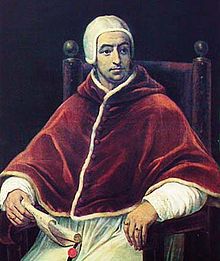Avignon Pope Benedict XIII
|
Antipope Benedict XIII |
|
|---|---|
| el Papa Luna | |
 |
|
| Diocese | Avignon, France |
| Elected | 28 September 1394 |
| Papacy began | 11 October 1394 |
| Quashed | 12 March 1403 |
| Papacy ended | 23 May 1423 |
| Predecessor | Clement VII |
| Successor | Clement VIII |
| Opposed to |
Roman claimants: Boniface IX Innocent VII Gregory XII Pisan claimants: Alexander V John XXIII |
| Other posts | Cardinal-Deacon of Santa Maria in Cosmedin |
| Orders | |
| Ordination | 3 October 1394 by Jean de Neufchatel |
| Consecration | 11 October 1394 by Jean de Neufchatel |
| Created Cardinal | 20 December 1375 |
| Rank | Cardinal-Deacon |
| Personal details | |
| Birth name | Pedro Martínez de Luna y Pérez de Gotor |
| Born | 25 November 1328 Illueca, Crown of Aragon |
| Died |
23 May 1423 (aged 95) Peniscola, Crown of Aragon |
| Buried | Castillo Palacio del Papa Luna, Illueca (skull) |
| Occupation | Professor |
| Previous post | Apostolic Administrator of Avignon (28 September 1394–1398) |
| Alma mater | University of Montpellier |
| Coat of arms | |
|
Papal styles of Benedict XIII |
|
|---|---|
 |
|
| Reference style | His Eminence (in Rome) His Holiness (in Avignon) |
| Spoken style | Your Eminence (in Rome) Your Holiness (in Avignon) |
| Religious style | Holy Father (in Avignon) |
Benedict XIII, born Pedro Martínez de Luna y Pérez de Gotor (25 November 1328 – 23 May 1423), known as el Papa Luna in Spanish, was an Aragonese nobleman and Avignon Pope during the Western Schism. He is considered by the Catholic Church to be an antipope.
Pedro Martínez de Luna was born at Illueca, Kingdom of Aragon (part of modern Spain) in 1328. He belonged to the de Luna family, who were part of the Aragonese nobility. He studied law at the University of Montpellier, where he obtained his doctorate and later taught Canon law. His knowledge of canon law, noble lineage, and austere way of life won him the approval of Pope Gregory XI, who appointed de Luna to the position of Cardinal Deacon of Santa Maria in Cosmedin on 20 December 1375.
In 1377 Pedro de Luna and the other cardinals returned to Rome with Pope Gregory, who had been persuaded to leave his papal base at Avignon by Catherine of Siena. After Gregory's death on 27 March 1378, the people of Rome feared that the cardinals would elect a French Pope and return the papacy to Avignon. Consequently, they rioted and laid siege to the cardinals, insisting on an Italian Pope. The conclave duly elected Bartolomeo Prignano, Archbishop of Bari, as Urban VI on 9 April, but the new Pope proved to be intractably hostile to the cardinals. Some of them reconvened at Fondi in September 1378, declared the earlier election invalid and elected Robert of Geneva as their new Pope, initiating the Western Schism. Robert assumed the name Clement VII and moved back to Avignon.
...
Wikipedia
